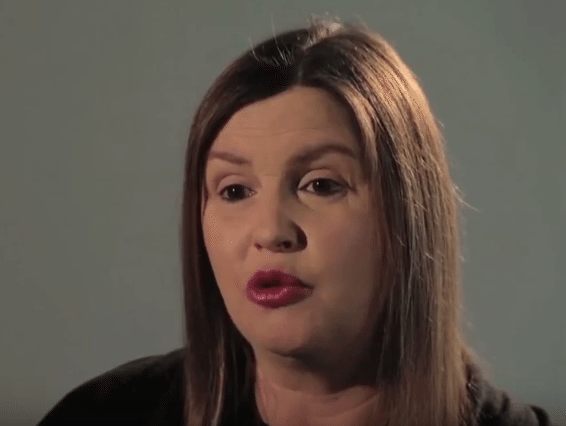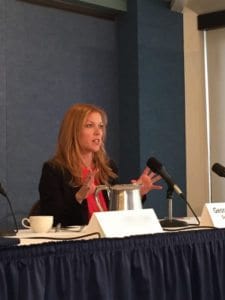Thirty-two years after starting her career in London, Nicola Horlick is still often the only woman in the room. Although she notes that is not a lot of progress, it has never fazed her. Nicola, once called London’s Superwoman, attributes her can-do attitude to a supportive father who told her she could do anything she put her mind to. In fact, in the UK where Horlick attended school, she attended an all boys school from age four to 13. And since Oxford only started accepting women at the time she attended, her college years were basically at an all-male institution as well. Thus, she is never affected by being in an all male environment.
 Horlick is very self-assured, many people interpret this as arrogance or a sense of entitlement, and she knows it, but Horlick is unapologetic in her confidence. Although married at 19 and with a first child at 23, Horlick entered the grueling finance industry. She started at SG Warburg and quickly found her niche in asset management. She became their youngest director at age 28. She was then headhunted by a firm called Morgan Grenfell (now Deutsche Bank) to turn around their wealth management, charities and pension business which had gone from £10B to £6B in the prior three years. After some personality and management style issues, Horlick was able to make the cuts and changes, such as merging management and research, that she needed to turn the performance to the opposite direction from £4.5B to £45B in the following four years. Even with this type of incredible performance, Horlick found herself on the firing line due to a fund manager scandalously losing money, her boss getting fired and a new inexperienced man being placed over her while she was on maternity leave. She came back early to try to sort out the situation but her style conflicted with the new boss and she was asked to resign. This situation was the first
Horlick is very self-assured, many people interpret this as arrogance or a sense of entitlement, and she knows it, but Horlick is unapologetic in her confidence. Although married at 19 and with a first child at 23, Horlick entered the grueling finance industry. She started at SG Warburg and quickly found her niche in asset management. She became their youngest director at age 28. She was then headhunted by a firm called Morgan Grenfell (now Deutsche Bank) to turn around their wealth management, charities and pension business which had gone from £10B to £6B in the prior three years. After some personality and management style issues, Horlick was able to make the cuts and changes, such as merging management and research, that she needed to turn the performance to the opposite direction from £4.5B to £45B in the following four years. Even with this type of incredible performance, Horlick found herself on the firing line due to a fund manager scandalously losing money, her boss getting fired and a new inexperienced man being placed over her while she was on maternity leave. She came back early to try to sort out the situation but her style conflicted with the new boss and she was asked to resign. This situation was the first  time Horlick said she had ever experienced sexism. She was a 36-year-old woman, making large sums of money, in a male dominated environment, with five children, and being blamed and pushed out of a business she created, which all escalated to a major news story. Reporters began following her, and even though she had been asked not to enter the premises she wanted to air her grievances to higher management at the company. After being denied in London, she ended up traveling all the way to Germany (without a coat and with reporters in tow) to meet with the senior management of Deutsche Bank. By the time she got there people were waiting for her and she was able to meet with the global heads of human resources and legal. The Frankfurt office put out a statement that they had discussed the issues with Horlick and were handling the problem, but the London office put out a statement that Horlick had resigned, full stop.
time Horlick said she had ever experienced sexism. She was a 36-year-old woman, making large sums of money, in a male dominated environment, with five children, and being blamed and pushed out of a business she created, which all escalated to a major news story. Reporters began following her, and even though she had been asked not to enter the premises she wanted to air her grievances to higher management at the company. After being denied in London, she ended up traveling all the way to Germany (without a coat and with reporters in tow) to meet with the senior management of Deutsche Bank. By the time she got there people were waiting for her and she was able to meet with the global heads of human resources and legal. The Frankfurt office put out a statement that they had discussed the issues with Horlick and were handling the problem, but the London office put out a statement that Horlick had resigned, full stop.
She chose not to bring a case for constructive dismissal, even though she was counseled that it would be successful, and instead went home and waited for the phone to ring with new opportunities, and it did. She went to Societe Generale (SocGen) and started a fund that rapidly grew to $12B in three years, and her equity stake was bought out by SocGen in 2001.
After tiring of traditional investment management, Horlick turned to more offbeat investments such as film, distressed funds, John Paulson’s hedge fund, certain real estate and other outside the box and slightly random opportunities. In 2008, after the death of her partner she sold her portion of this business and really launched into alternative assets and finance such as film development, small infrastructure projects, crematoria, pubs, care homes all using tax advantageous structures for high net worth individuals. She also set up Glentham Capital, a film finance fund, and says that we may see her at the academy awards in a few years time.
 In 2013 she started Money&Co, a peer-to-peer lending platform for small business lending which now takes the majority of her time. It has grown quickly with 11 full-time employees and two part-time business development staff. After an upcoming third round of financing, she plans to hire six or seven more people. Right now they are focusing on small business senior loans and plan to move into the lease financing vertical in the near future, with a group of lease finance specialists that will soon be joining the team. Interestingly, the lease fund (comprised of UK leases) will be financed primarily by US banks and investors. As Horlick notes, there is a lot of US money finding its way to the UK market as there is too much money chasing too few deals.
In 2013 she started Money&Co, a peer-to-peer lending platform for small business lending which now takes the majority of her time. It has grown quickly with 11 full-time employees and two part-time business development staff. After an upcoming third round of financing, she plans to hire six or seven more people. Right now they are focusing on small business senior loans and plan to move into the lease financing vertical in the near future, with a group of lease finance specialists that will soon be joining the team. Interestingly, the lease fund (comprised of UK leases) will be financed primarily by US banks and investors. As Horlick notes, there is a lot of US money finding its way to the UK market as there is too much money chasing too few deals.
As for the small business lending site, it works a bit like an auction, where the loan is originated with a first lien over all of the assets of the company, then the debt is sliced up into different instruments than can be bid on at different interest rates. Money&Co’s credit team applies a rating to guide investors on what the range should be. The borrowers are required to be profitable companies and will only be lent twice annual EBITDA. This lower risk profile is reflected in average interest rates of 9%. When looking at the entire loan portfolio, 70% has been financed by high net worth individuals, 24.5% has been financed by the crowd (what we would call unaccredited investors) and 5.5% has been financed by institutions. Horlick stated that the institutional investors are on the rise, and is wary that they cannot be allowed to cherry pick the better loans over the members of the crowd.
 Horlick says that differentiation of Money&Co really comes down to technology, especially in credit analysis. They use a process like an like an electronic sieve to pull in an enormous amount of data from APIs to Companies House (like our state secretaries offices), Experion and other sources, and then distil it into a workbook for the credit analyst. If the loan is less than $300,000, then the loan may be approved promptly. After completing the platform’s due diligence process, management completes a site visit with each borrower. If the loan is approximately $750,000 or a transaction based loan, then the borrower must have both a site visit and be approved by the credit committee which is comprised of Horlick, her number two, the nonexecutive director, and the managing director.
Horlick says that differentiation of Money&Co really comes down to technology, especially in credit analysis. They use a process like an like an electronic sieve to pull in an enormous amount of data from APIs to Companies House (like our state secretaries offices), Experion and other sources, and then distil it into a workbook for the credit analyst. If the loan is less than $300,000, then the loan may be approved promptly. After completing the platform’s due diligence process, management completes a site visit with each borrower. If the loan is approximately $750,000 or a transaction based loan, then the borrower must have both a site visit and be approved by the credit committee which is comprised of Horlick, her number two, the nonexecutive director, and the managing director.
They have lent over $11M in the past 15 months, but Horlick states that due to institutional appetite, we can expect rapid growth in this amount.
Some of the borrowers include engineering businesses (part maker, aircraft servicing, and manufacturing), food businesses (soups, coconut products), a business that coaches people to do public speaking, a company that provides legal documents (such as wills, etc.), a debt collector, a barber shop that caters to males ages 15-25 and has play stations for use and free beer while getting their hair cut, a company that manufactures and rents out large tents for big events and a company that tracks large sea bound vessels.
When asked about defaults, Horlick noted that since their launch 15 months ago, they have had one company miss a payment; she expected it to make its payment the following day. Some borrowers are asked if they will provide a personal guarantee of the business owner if it is deemed “asset light”. The average term of the loans provided is four years.
 Horlick decided to focus on small business peer to peer lending when she looked at the P2P space and noted that Zopa and others had already cornered the consumer lending angle. Small business lending was appealing, especially at the loan size Money&Co is doing (average $500,000), since there weren’t many other players in the space. Horlick feels this is relatively safe niche for Money&Co, but wants to do more. She envisions providing additional services to borrowers and moving into other verticals such as leasing, used car finance, intellectual property, specialty real estate, import/export finance and invoice discounting.
Horlick decided to focus on small business peer to peer lending when she looked at the P2P space and noted that Zopa and others had already cornered the consumer lending angle. Small business lending was appealing, especially at the loan size Money&Co is doing (average $500,000), since there weren’t many other players in the space. Horlick feels this is relatively safe niche for Money&Co, but wants to do more. She envisions providing additional services to borrowers and moving into other verticals such as leasing, used car finance, intellectual property, specialty real estate, import/export finance and invoice discounting.
Horlick is also contemplating expanding into the US and is researching the best way to do it. She states that her platform can support 5,000,000 users and is agnostic to industry and product verticals and jurisdiction. She said she will likely greenfield rather than acquire a preexisting platform.
As a final thought, Horlick mentioned Asia and stated that it is totally underbanked and flush with opportunity. She projects that the cash economy there may completely bypass traditional banking and go straight to using platforms.
For a woman with a long career in high finance, P2P lending may seem like an odd place to end up, but the road less traveled is certainly not uncharted territory to Horlick.
 Georgia P. Quinn is the CEO and co-founder of iDisclose, an adaptive web-based application that enables entrepreneurs to prepare customized institutional grade private placement documents for a fraction of the time and cost. Heralded by Thomson-Reuters as a Top Female Attorney in New York City, she also serves as of counsel at the leading firm in crowdfunding, Ellenoff, Grossman & Schole, specializing in facilitating financial transactions and compliance with JOBS Act regulations. A foremost expert in corporate finance, she has worked on over $1 billion in business transactions over the course of her legal career. Prior to founding iDisclose, Georgia represented several Fortune 500 companies in financings for six years at Weil, Gotshal & Manges, one of the top ten law firms in the world, and then for over two years at Seyfarth Shaw, a leader in legal technology. As a globally recognized thought leader in the crowdfunding space, she has been a featured speaker at multiple conferences and has presented to such authorities as the Securities and Exchange Commission (SEC) and the American Bar Association (ABA).
Georgia P. Quinn is the CEO and co-founder of iDisclose, an adaptive web-based application that enables entrepreneurs to prepare customized institutional grade private placement documents for a fraction of the time and cost. Heralded by Thomson-Reuters as a Top Female Attorney in New York City, she also serves as of counsel at the leading firm in crowdfunding, Ellenoff, Grossman & Schole, specializing in facilitating financial transactions and compliance with JOBS Act regulations. A foremost expert in corporate finance, she has worked on over $1 billion in business transactions over the course of her legal career. Prior to founding iDisclose, Georgia represented several Fortune 500 companies in financings for six years at Weil, Gotshal & Manges, one of the top ten law firms in the world, and then for over two years at Seyfarth Shaw, a leader in legal technology. As a globally recognized thought leader in the crowdfunding space, she has been a featured speaker at multiple conferences and has presented to such authorities as the Securities and Exchange Commission (SEC) and the American Bar Association (ABA).
 This is part of a series of articles where Crowdfund Insider will be interviewing the many women changing the profession of finance today. In FinTech, crowdfunding and peer to peer lending, there are many female entrepreneurs leading or assisting innovative firms that are altering the process of capital formation around the globe.
This is part of a series of articles where Crowdfund Insider will be interviewing the many women changing the profession of finance today. In FinTech, crowdfunding and peer to peer lending, there are many female entrepreneurs leading or assisting innovative firms that are altering the process of capital formation around the globe.

